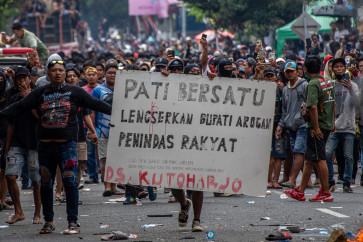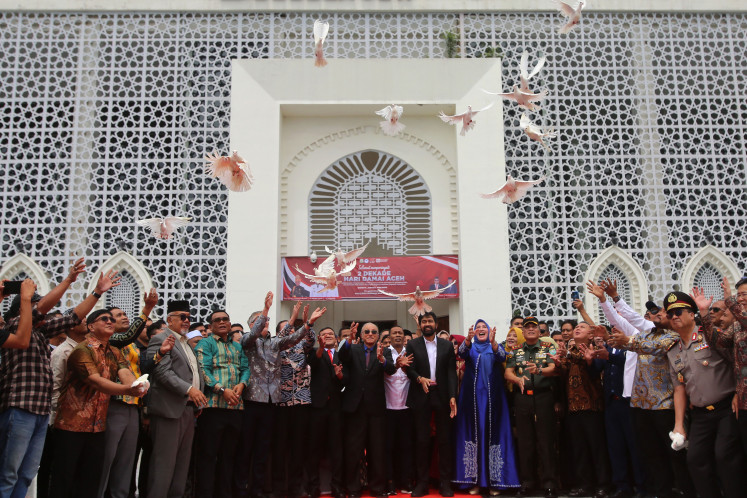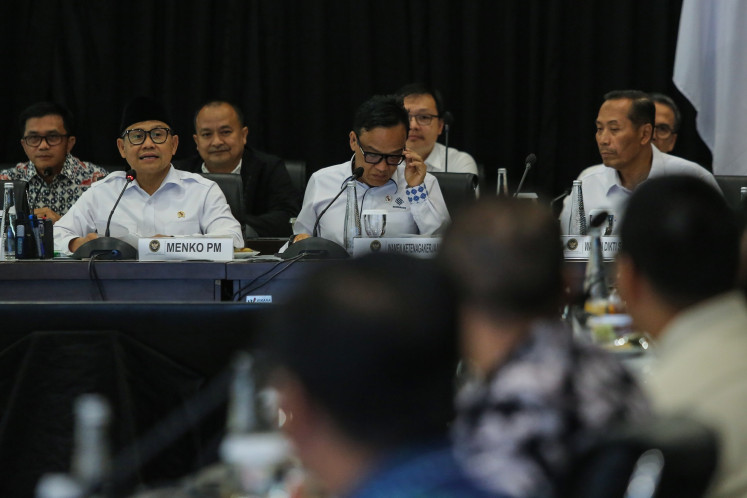Popular Reads
Top Results
Can't find what you're looking for?
View all search resultsPopular Reads
Top Results
Can't find what you're looking for?
View all search resultsNo recession in Indonesia
The United States, European Union and Japan are in economic recession
Change text size
Gift Premium Articles
to Anyone
The United States, European Union and Japan are in economic recession. But there is no global recession. The countries of the South, including Indonesia, currently the second largest Muslim economy in the world, face an economic downturn.
President Susilo Bambang Yudhoyono and Finance Minister Sri Mulyani Indrawati are already doing what British Prime Minister Gordon Brown proposed for the UK, Europe and the U.S., to bolster liquidity and stimulate consumer and public demand.
With Keynesian pump priming and mobilization of the state bureaucracy and private sector together, Indonesia may, at the worst, lose half a per cent growth in 2009.
This will not be helped by the International Monetary Fund (IMF) nor economists from the Economic Intelligence Unit (EIU) attempting to impose a recession on Indonesia and the developing world.
A recession means that a national economy has suffered negative economic growth in two successive quarters.
Now the IMF and EIU tell us a world recession is when global growth falls below 3 percent or 2.5 percent. Then the EIU argues Indonesian growth might fall to 3.7 percent in 2009, when the local consensus is 5.5 percent.
They used to say in the second world war in the UK that dangerous talk costs lives. In this case dangerous talk could cost Indonesian money and jobs.
Confidence is everything. Despite global conditions Indonesian economic growth in 2009 is a function of leadership and capacity. Indonesia has the first and must rapidly improve the second. Politics must decide economics, not the reverse.
This crisis of confidence in the Western banking and financial system comes during the dying days of the most unpopular American Presidency in living memory.
President-elect Obama and Nancy Pelosi, the Speaker of the House of Representatives, have their work cut out. The new Democrat leadership has inherited an economic disaster and must fight desperately to save the U.S. auto industry before it collapses, while two million Americans may lose their homes, and millions may lose their jobs.
Yet the devastating legacy of the Bush Presidency, of greed and war, leaves open great opportunities for Indonesia, the Muslim world and developing countries of the South.
Indonesia can play a key role in leading the world towards economic recovery.
First by managing the national economy to maintain growth, demand, imports and exports. The nominal Gross Domestic Product for 2009 is projected at US$547 billion. Indonesia is already in the top 20 economies of the world.
Indonesia is overtaking Belgium and Sweden in GDP size. It can overtake Turkey, the Netherlands and Austria and join the top ten world economies within two decades.
Second, by mobilizing investment for oil, gas, energy projects, bio-fuels, infrastructure (roads, railways, ports), manufacturing and retailing. Indonesia needs over $50 billion for electricity alone, to finance 40,000 Mwe of power and transmission lines by 2025. Total foreign investment needed in the next 15 years exceeds $100 billion.
Alongside the U.S. and EU Indonesia is getting new investment from the BRICs (Brazil, Russia, India, China) and from APEC countries like Canada, Japan, Korea, Taiwan as well as ASEAN States including Brunei, Malaysia, Philippines, Singapore and Thailand. Investment for infrastructure, agriculture and biofuels is coming from the Gulf States, Saudi Arabia and Israel.
Third Indonesia can help lead Muslim and southern economies by using its economic size and prestige as a member of the U.N. Security Council to work with southern countries to change policies and the balance of power in the World Bank, the IMF and the World Trade Organization.
As the Indian Finance Minister, P. Chidambaram told the India World Economic Forum on Tuesday the G-20 has replaced the G-7 as the key body to tackle economic problems.
Indonesia has major reservations about the IMF following its own experience in 1998. German Finance Minister Peer Steinbrueck recently said that the world should not slip into creating a shadow world economic government run by an inner IMF council.
Indonesia lost 10 years as a result of the 1998 banking crash when it put its fate in the hands of the IMF, which initially failed to understand Indonesian strengths and exaggerated weaknesses.
An historical photo showed President Soeharto sitting at his desk, signing his own political death-warrant while the IMF Representative stood over him, as he signed an IMF agreement.
In the 1998 bank crash Indonesia had no freedom and no choice. This time in 2008 Indonesia has freedom and is stronger, and can chose to tread its own path.
Hopefully its greater strength and determination will inspire Muslim and southern countries not to panic in the face of recession in the West, but to work together to combat recession and economic downturn and to build a new world economic order.
The writer is a development economist who writes from Jakarta, Indonesia, on modernization in the Muslim world, investment and trade relations with the EU and Islamic banking.










